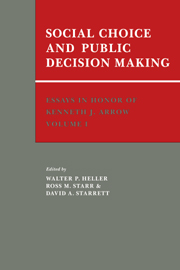Book contents
- Frontmatter
- Contents of Volumes I, II, III
- List of contributors
- Editors' preface
- Kenneth J. Arrow
- Contents
- PART I SOCIAL CHOICE
- 1 Consequentialist social norms for public decisions
- 2 Information and invariance in normative choice
- 3 Utilitarian morality in a world of very half-hearted altruists
- 4 On the implementation of social choice rules in irrational societies
- 5 Walrasian social choice: some simple axiomatic approaches
- PART II DECISION MAKING IN THE PUBLIC SECTOR
- Author index
1 - Consequentialist social norms for public decisions
Published online by Cambridge University Press: 05 November 2011
- Frontmatter
- Contents of Volumes I, II, III
- List of contributors
- Editors' preface
- Kenneth J. Arrow
- Contents
- PART I SOCIAL CHOICE
- 1 Consequentialist social norms for public decisions
- 2 Information and invariance in normative choice
- 3 Utilitarian morality in a world of very half-hearted altruists
- 4 On the implementation of social choice rules in irrational societies
- 5 Walrasian social choice: some simple axiomatic approaches
- PART II DECISION MAKING IN THE PUBLIC SECTOR
- Author index
Summary
A consequence cannot make evil an action that was good nor good an action that was evil.
St. Thomas AquinasThat the morality of actions depends on the consequences which they tend to produce, is the doctrine of rational persons of all schools; that the good or evil of these consequences is measured solely by pleasure or pain, is all of the doctrine of the school of utility, which is peculiar to it.
J. S. Mill (from Warnock, 1962, p. 120)It must always be the duty of every agent to do that one, among all the actions which he can do on any given occasion, whose total consequences will have the greatest intrinsic value.
G. E. Moore (1912, p. 121)Motivation and outline
Introduction
Ever since the publication of the first edition of Arrow's Social choice and individual values, controversy has surrounded several of the conditions that he showed would lead inexorably to a dictatorship. Some of the controversy was discussed in the second edition (Arrow 1963). Much has happened since then, largely reflected in Sen (1970, 1982, 1984, 1985) as well as Arrow (1983).
Two conditions in particular were often relaxed in an attempt to escape from dictatorship. One was independence of irrelevant alternatives, and a second was ordinality of the social choice function.
Information
- Type
- Chapter
- Information
- Essays in Honor of Kenneth J. Arrow , pp. 3 - 28Publisher: Cambridge University PressPrint publication year: 1986
Accessibility standard: Unknown
Why this information is here
This section outlines the accessibility features of this content - including support for screen readers, full keyboard navigation and high-contrast display options. This may not be relevant for you.Accessibility Information
- 7
- Cited by
